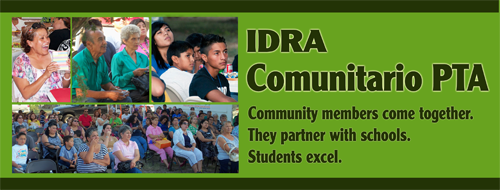

Videos about Comunitario PTA


W.K Kellogg Foundation convened national leaders to highlight innovative approaches to family engagement in education. They visited IDRA to see how family engagement set up as a shared responsibility among families, schools and communities can transform schools for all children. Leaders of the first PTA Comunitario described their exciting and pioneering work for education among families living in South Texas colonias. [8:45 min]


See video interview of Aurelio M. Montemayor, M.Ed., about communities using data. He tells the story of a group of low-income Spanish-speaking families and their high school children used data and surveys to collaborate with their school to improve math instruction. He states: “If data is presented in meaningful chunks, parents will look it, will ask the right questions and, if supported and encouraged, will take steps to at least dig deeper in a way that will help the school understand: here is what we need to do to resolve this problem.” [06:02 min]


PSJA ISD announced recently that the district is the recipient of a 5.6 million dollar federal grant to expand the early college high school, ECHS, model. It’s part of the Early College Expansion Partnership that includes Brownsville ISD, Educate Texas, and Jobs for the Future. The grant is funded by the U.S. Department of Education’s Investing in Innovation, i3 Fund. Published on May 17, 2013. [3:44 min]


National PTA –Emerging Minority Leaders Conference
In this 2013 keynote presentation in Washington, D.C., Aurelio M. Montemayor, M.Ed., contrasts traditional parent involvement with a new paradigm of powerful family engagement. He outlines IDRA’s six principles for family engagement:
- Families can be their children’s strongest advocates.
- Families of different race, ethnicity, language, and class are equally valuable.
- Families care about their children’s education and are to be treated with respect, dignity, and value.
- Within families, many individuals play a role in the children’s education.
- Family leadership is most powerful at improving education for all children when collective efforts create solutions for the common good.
- Families, schools, and communities, when drawn together, become a strong, sustainable voice to protect the rights of all children.
And he tells the Comunitario PTA story. “At the local level, they want to use the PTA name to make sure they have high quality instruction, the kids are learning and they’re safe. That’s a good PTA. Coming together with the respect that people who are raising kids have for each other.” Aurelio discusses the three main phases of the PTA Comunitario: Established in a community base, Connects with one or more schools, and Leads data-based projects related to student achievement.
The Emerging Minority Leaders Conference (EMLC) is held in conjunction with the Annual National PTA Convention. EMLC trains new PTA leaders to effectively engage ethnically diverse families and underserved school populations through various bridge-building techniques. This presentation also includes participant sharing following off-camera table discussions. [01:03:35]
Also available on YouTube!
See the slides on Slideshare.

